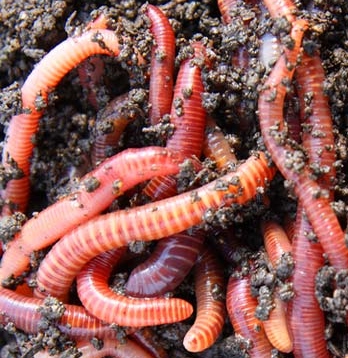Organic farming red worms: Guide to thriving setups
Organic farming red worms: Guide to thriving setups
Blog Article
Boost Soil Wellness Normally With Red Wigglers
The integration of red wigglers right into dirt management techniques presents an engaging approach for boosting soil health and wellness normally. These earthworms not only transform natural waste into beneficial vermicompost, yet their natural behaviors likewise advertise improved soil structure, aeration, and vitamins and mineral accessibility.
Advantages of Red Wigglers

Moreover, red wigglers improve soil framework by creating channels as they delve via the earth. This task enhances oygenation and drainage, facilitating root growth and making sure that plants get appropriate oxygen and moisture. Furthermore, the spreadings created by red wigglers are high in nutrients such as nitrogen, phosphorus, and potassium, which are essential for plant advancement.
Red wigglers also aid in the reduction of harmful pathogens and pests by outcompeting them for resources, further adding to a healthier dirt atmosphere. Their visibility can lead to a reduction in the demand for synthetic plant foods and pesticides, promoting lasting farming practices. Overall, incorporating red wigglers right into soil management approaches gives a natural and efficient means of improving dirt vigor, thus supporting robust plant growth and agricultural performance.
Establishing Up Vermicomposting
Developing a vermicomposting system is a sensible method to harness the remarkable advantages of red wigglers in enhancing dirt health. red wigglers. To begin, select a suitable container-- ideally, a plastic or wood container with a cover to preserve wetness and temperature. The container needs to have drainage openings to stop excess water build-up
Next, prepare bed linens material, which works as a habitat for the worms. Ideal products consist of shredded paper, cardboard, or coconut coir. Objective for a deepness of 4-6 inches to offer ample space for the worms.
When the bedding remains in place, introduce the red wigglers, commonly at a proportion of one extra pound of worms for every square foot of surface in the bin. Following this, include kitchen area scraps such as fruit and vegetable peels, coffee premises, and crushed eggshells. Stay clear of meat, dairy products, and oily foods, as these can attract parasites.
(red wigglers)
Taking Care Of Your Worms
Keeping the health of your red wigglers is vital for a flourishing vermicomposting system. Appropriate care makes sure that these useful organisms can successfully damage down organic matter and enrich your soil.
Feeding your worms is one more crucial aspect of their care. Red wigglers flourish on kitchen scraps such as fruit and vegetable peels, coffee grounds, and smashed eggshells.
Temperature administration is crucial; worms favor a variety of 55 to 77 levels Fahrenheit. By following these guidelines, you will promote a healthy ecological community for your red wigglers.
Making Use Of Worm Castings in Soil
Worm castings, frequently described as "black gold," are an effective modification that can considerably enhance dirt health and wellness and fertility. red wigglers. These nutrient-rich, natural fertilizers are created by red wigglers during their digestion process, resulting in a carefully distinctive product that is valuable for plants and dirt alike
Including worm castings into your soil enhances its framework, boosting aeration and water retention. This is especially beneficial for sandy soils that drain too promptly, as well as hefty clay soils that can become compressed. Additionally, worm spreadings are teeming with important nutrients, including nitrogen, phosphorus, and potassium, which are vital for plant development.

Ultimately, making use of worm castings promotes a thriving environment within the dirt, resulting in much healthier plants and even more sustainable horticulture practices.
Tips for Successful Composting
Effective composting requires careful attention to a few vital concepts that can substantially enhance the top quality of the last item. Balance is important; maintain a correct ratio of environment-friendly materials (nitrogen-rich) to brown materials (carbon-rich), ideally around 1:3. This balance assists in efficient decay and reduces smells.
2nd, aeration plays an important role. Frequently transforming the compost heap enhances oxygen flow, which speeds up microbial task and quicken the composting procedure. Go for a heap size of at the very least three feet by 3 feet to maintain warmth, which better promotes disintegration.
(Lake James Bait)
Wetness web content is another necessary factor; the garden compost needs to perspire but not soggy. A good general rule is to achieve a moisture degree comparable to that of a wrung-out sponge. Also much water can bring about anaerobic problems, while too little can reduce down decay.
Last but not least, keep an eye on the temperature level of the garden compost. A temperature range of 130 ° F to 160 ° F shows energetic composting and assists kill pathogens and weed seeds. By adhering to these concepts, you will certainly produce a nutrient-rich compost that sustains dirt health and improves plant growth.
Conclusion
Including red wigglers right into gardening practices boosts soil wellness with natural processes. These worms add to the failure of organic materials, causing nutrient-rich vermicompost that enhances soil framework and fertility. Their burrowing actions promote oygenation and water drainage while subduing dangerous microorganisms and bugs. By developing and keeping a vermicomposting system, garden enthusiasts can foster a lasting environment that sustains durable plant development and lasting soil resilience, eventually benefiting agricultural productivity and ecological wellness.
Report this page